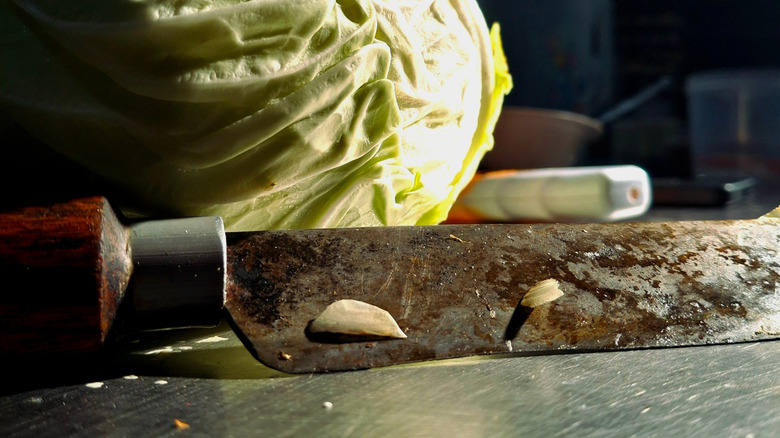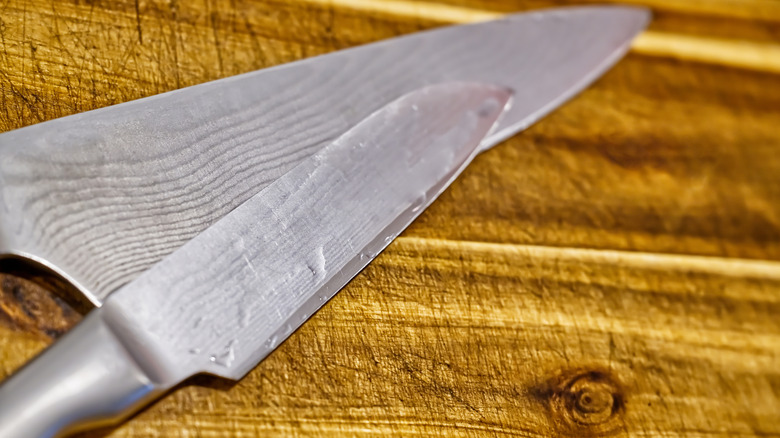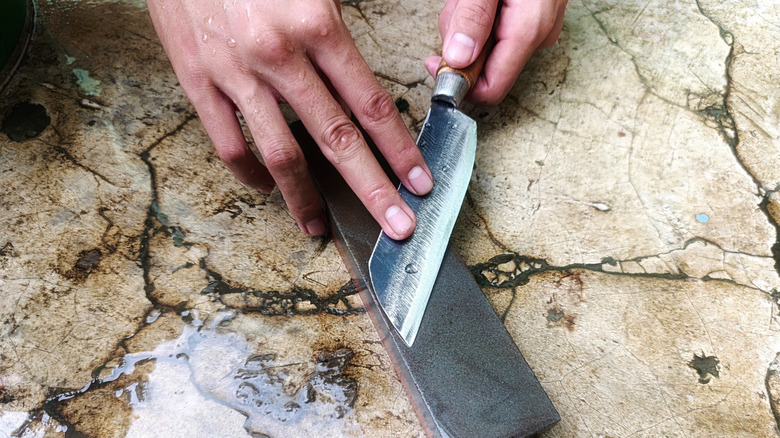Why Your Kitchen Knives Get Rusty (And How To Clean Them)
Unless you're a character in a horror film, there is no reason your kitchen knives should look like a prop from Texas Chainsaw. While a number of factors can contribute to rust spots and stains on your cooking utensils, it's never ideal to find them. From moisture to acidic ingredients, your knives come into contact with many elements that could cause rust on the metal. Knowing how to combat this will help keep your cutting tools ready for use and in good condition longer, saving money as well as time when it comes to cooking and prepping with them. Thankfully, there are several helpful ways to get rid of rust stains in your kitchen and on your utensils. Properly drying your utensils after use and scrubbing with abrasive materials to remove any rust is imperative, as is treating your metals with oils to keep them protected from moisture and humidity, as well as oxidation.
While many factors can contribute to rust on your knives, one of the primary causes is acidic and salty foods.Certain fruits, foods, and vegetables have chemicals that can begin to react with the knives, so always make sure to thoroughly wash them with warm soap and water after cutting any of these. Don't let the leftovers from your cooking remain on the metal for too long after use and make sure to pay attention to the base of the knife where it connects with the handle, as ingredients can get stuck here.
Moisture and oxidation can cause rust
Another main thing that can leave rust spots behind is moisture. Whether this is water that was not dried properly after a wash or caused by a humid environment, when your knives are exposed to moisture, they will likely get rusty. After you wash your cutlery and utensils, make sure to use a dish towel to properly dry them if you're washing by hand. It will also help to leave them out to air dry after you've wiped off the majority of the water before placing them back in your drawers or cabinets.
If you use the dishwasher, make sure you take all your knives out after they're clean, and ensure there are no wet spots. Again, pay special attention to the base where the plastic or wood handle connects to the metal, as moisture can lurk here and cause rust. Drying is the most important part of cleaning your kitchen knives, so take your time with this step. Once your items are clean, consider creating safe knife storage with a knife block or magnetic strip to protect your pieces and keep them well-ventilated when not in use. If possible, avoid storing these cutting tools in drawers as they tend to be damp and poorly ventilated, accelerating the chance of rust. Plus, storing knives haphazardly in drawers can lead to chips on the metal from hitting random utensils.
How to keep your knives rust-free
To remove rust, you have a few different options. You can soak your knives in vinegar, allowing them to stay in this liquid for at least five minutes, before you scrub the loosened rust spots with a soft sponge. If the rust doesn't come off with that, you can try using a slightly abrasive cleaner, like a baking soda paste, to really scrub away spots. You could also purchase rust erasers, which are made to help remove rust. Another way to easily remove rust with a pantry staple involves cleaning with a potato. These vegetables contain oxalic acid, which can help loosen the rust on the blade when rubbed along the metal.
Once your knives are clear of any stains, it's very important to keep them maintained. Start by oiling your knives, and the specific oil you'll use will vary depending on the knife's material. The oil should be applied after thoroughly cleaning and washing them. Mineral-grade food oils can work, but make sure to research the ideal type for your knives. Use a clean cloth to wipe away any excess oil, as you still don't want too much moisture anywhere on the knife. It's usually better to wash your knives by hand rather than in the dishwasher, and sharpening them can also keep rust at bay, especially if it has already formed. Sharpening takes off layers of metal that hold rust, revealing fresh metal underneath.


